Demolition Contractors Hythe
Find Demolition Experts in Hythe
Receive 3 FREE Demo Companies quotes for your project today! Compare profiles, reviews, accreditations, portfolio, etc... and choose the best service.
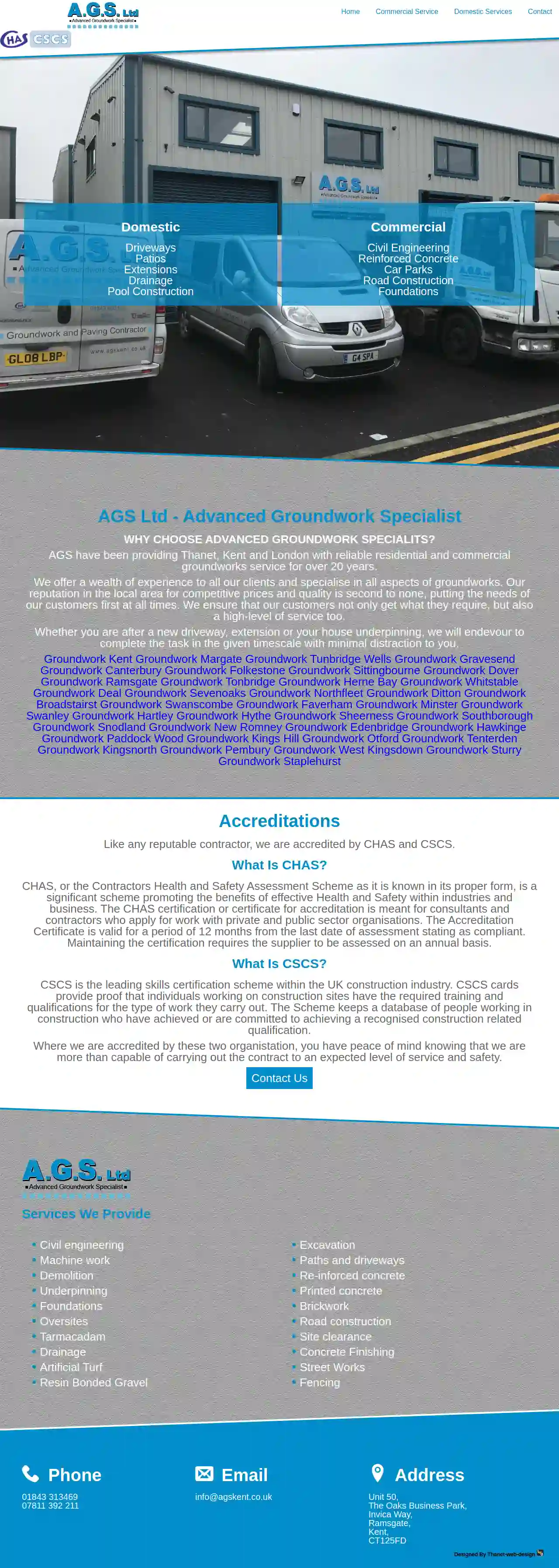
Advanced Groundwork Specialist
Unit 50, The Oaks Business Park, Invica Way, Ramsgate, Kent, CT125FD, GBAGS Ltd - Advanced Groundwork Specialist AGS have been providing Thanet, Kent and London with reliable residential and commercial groundworks service for over 20 years. We offer a wealth of experience to all our clients and specialise in all aspects of groundworks. Our reputation in the local area for competitive prices and quality is second to none, putting the needs of our customers first at all times. We ensure that our customers not only get what they require, but also a high-level of service too. Whether you are after a new driveway, extension or your house underpinning, we will endeavour to complete the task in the given timescale with minimal distraction to you. Accreditations Like any reputable contractor, we are accredited by CHAS and CSCS. What Is CHAS? CHAS, or the Contractors Health and Safety Assessment Scheme as it is known in its proper form, is a significant scheme promoting the benefits of effective Health and Safety within industries and business. The CHAS certification or certificate for accreditation is meant for consultants and contractors who apply for work with private and public sector organisations. The Accreditation Certificate is valid for a period of 12 months from the last date of assessment stating as compliant. Maintaining the certification requires the supplier to be assessed on an annual basis. What Is CSCS? CSCS is the leading skills certification scheme within the UK construction industry. CSCS cards provide proof that individuals working on construction sites have the required training and qualifications for the type of work they carry out. The Scheme keeps a database of people working in construction who have achieved or are committed to achieving a recognised construction related qualification. Where we are accredited by these two organisations, you have peace of mind knowing that we are more than capable of carrying out the contract to an expected level of service and safety.
- Services
- Why Us?
- Accreditations
- Gallery
Get Quote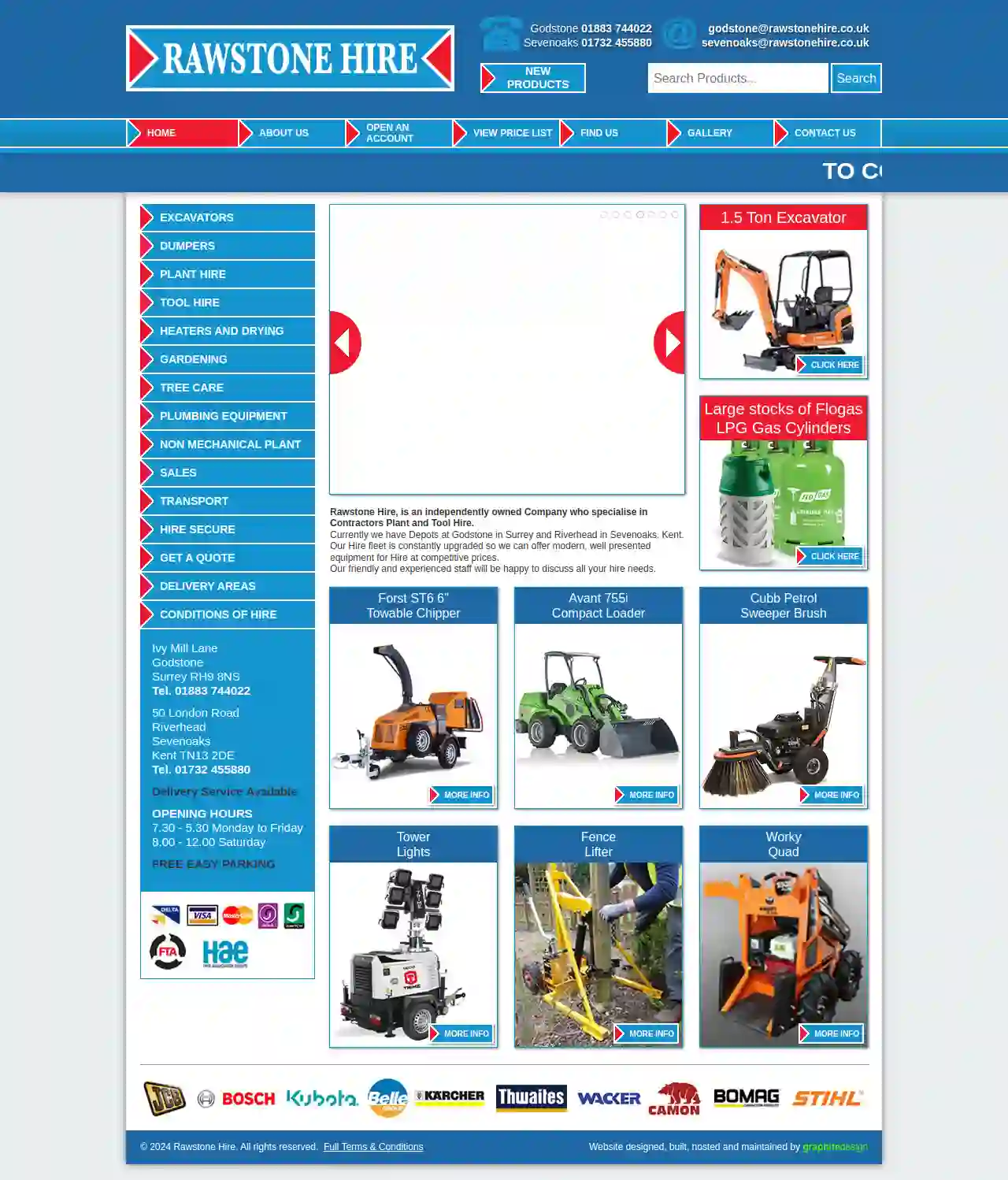
Rawstone Hire
433 reviewsIvy Mill Lane, GodstoneSurrey, Ivy Mill LaneGodstoneSurrey, Godstone, RH9 8NS, GBRawstone Hire: Your Trusted Partner for Plant and Tool Hire Rawstone Hire is an independently owned company specializing in providing contractors with top-quality plant and tool hire solutions. We have depots strategically located in Godstone, Surrey, and Riverhead, Sevenoaks, Kent, ensuring convenient access to our extensive hire fleet. Our commitment to excellence is reflected in our constantly upgraded equipment, offering modern, well-presented tools and machinery at competitive prices. At Rawstone Hire, we understand the importance of reliable and efficient equipment for your projects. Our friendly and experienced team is dedicated to providing personalized service and expert advice to meet your specific hire needs. Whether you require excavators, dumpers, or a wide range of tools, we have the right equipment to support your success. We take pride in offering a comprehensive range of services, including: Plant Hire Tool Hire Heaters and Drying Equipment Gardening Equipment Tree Care Equipment Plumbing Equipment Non-Mechanical Plant Sales Transport Hire Secure Our commitment to customer satisfaction is evident in our dedication to providing a seamless experience. We offer convenient delivery services and flexible hire options to suit your project requirements. Contact us today to discuss your hire needs and let us help you achieve your project goals.
- Services
- Why Us?
- Gallery
Get Quote
Jack’s Excavation & Construction
532 reviewsHopatcong, 07843, GBWho We Are At Jack's Landscaping & Excavating, we not only focus on providing high quality lawn-care solutions, but additionally have been delivering these services at a very reasonable price for the last 10 years! At Jack's Excavation & Construction, we not only focus on providing high quality commercial & residential lawn-care / excavating solutions, but additionally strive to deliver these services at a very reasonable price for the last 11 years! Our services include: Retaining Wall Installation / Repair Drainage Installation / Repair Septic Installation / Repair Tree Stump Removal Land Clearing Foundation Installation / Repair Paver Installation / Repair Concrete Installation / Repair Utility Trenching Demolition Work Dirt & Debris Removal Sod Installation / Repair Mulching Planting Grass Seeding Asphalt Installation / Repair So Don't Hesitate To Call for a fREE estimate! or better yet, You can Conveniently Start the Estimate process By Clicking The Button Below! So Don't Hesitate To Call or book a fREE estimate!
- Services
- Why Us?
- Gallery
Get Quote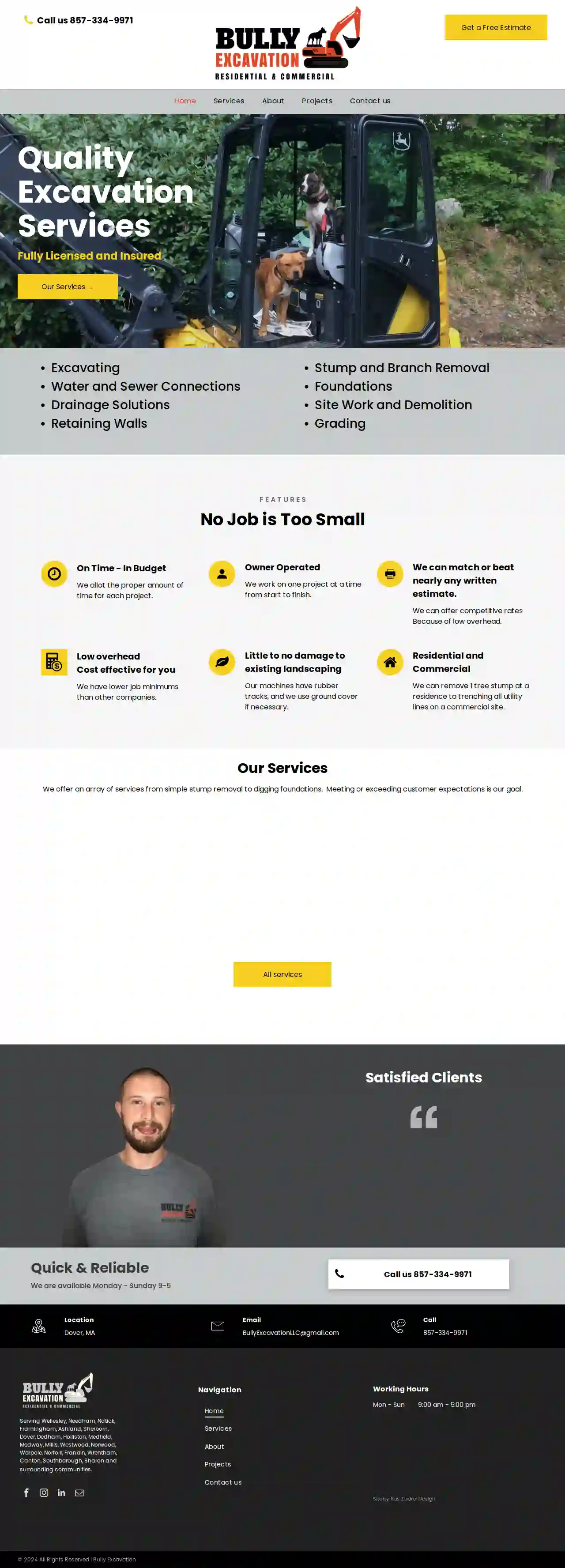
Bully excavation
Dover, MA, GBAbout Bully Excavation David Van Tassell, the founder and operator of Bully Excavation, has always had a passion for all things mechanical. Growing up, he spent countless hours working on cars and in his grandfather's wood shop. As a teenager, he often tackled his own car repairs. Dave graduated from Northeastern University in 2007 with a Bachelor's degree in Mechanical Engineering. After working as an engineer for Pratt and Whitney, he went on to work at a small start-up company in South Boston. Dave's entrepreneurial spirit and strong work ethic have made Bully Excavation a successful company. Our Mission At Bully Excavation, our mission is to provide our clients with high-quality excavation services, cost-effective construction, and clear communication. We strive to build lasting relationships with our customers by consistently exceeding their expectations. Need help with an outdoor project? Don't hesitate to reach out to us! We're here to help you get started.
- Services
- Why Us?
- Our Team
- Testimonials
- Gallery
Get Quote
Pine Hill Excavation Inc.
Cape Neddick/York, Maine, York, GBAbout Pine Hill Excavation Pine Hill Excavation was established in 2004 by Dana Goldberg, a seasoned professional with over 40 years of experience in excavation, landscaping, and construction. Dana has been a resident of Southern Maine for most of his life and currently resides there with his wife and three children. Known for its reliability and expertise, Pine Hill Excavation has earned the trust of numerous major contractors and local residents throughout Southern Maine. We are your go-to choice for all your excavation and aggregate delivery needs. Our service area encompasses York, Ogunquit, Kittery, Wells, The Berwicks, Elliott, and Kennebunk.
- Services
- Why Us?
- Our Team
- Gallery
Get Quote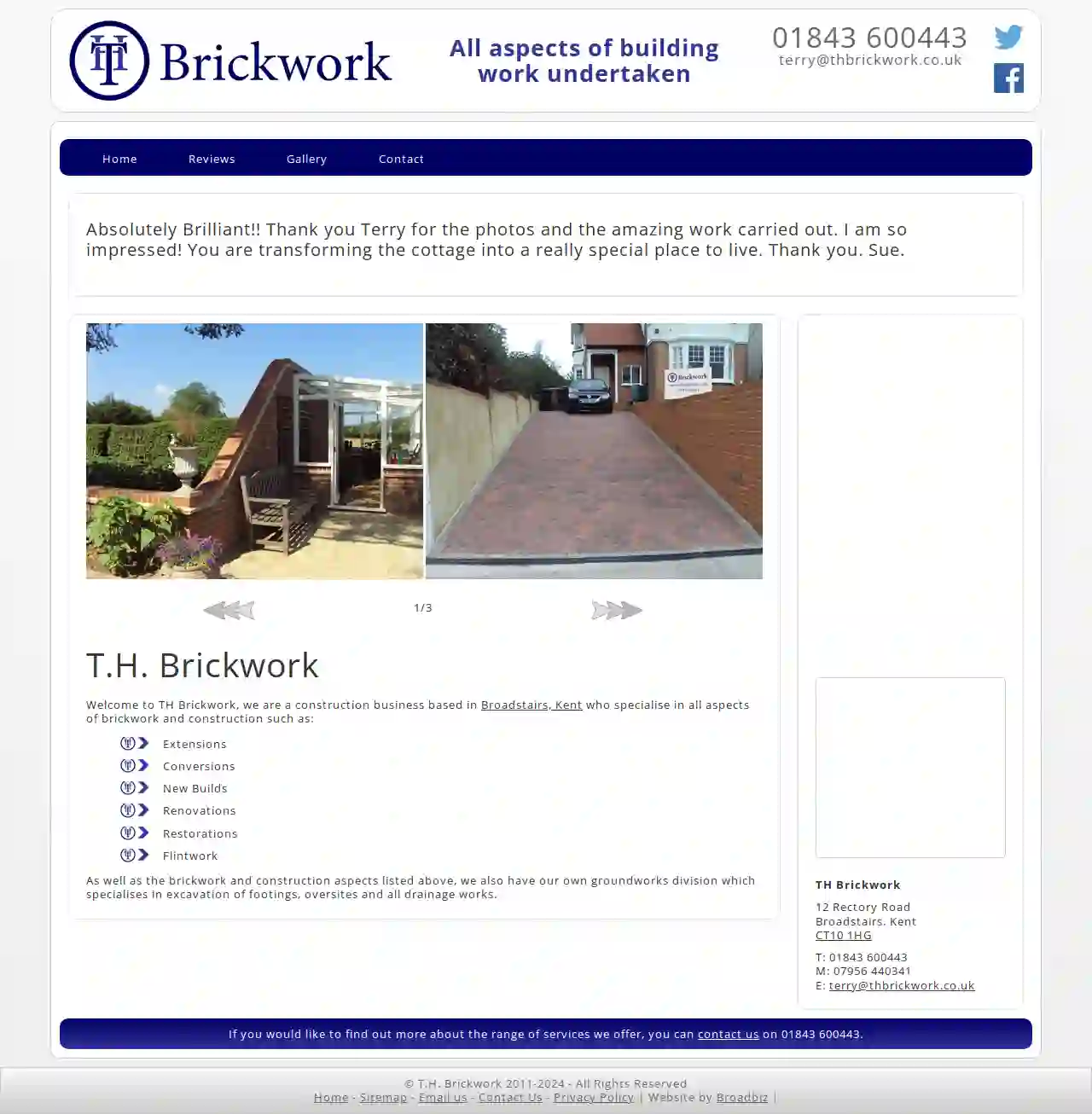
TH Brickwork
53 reviews12 Rectory Road, Broadstairs, CT10 1HG, GBWelcome to TH Brickwork We are a construction business based in Broadstairs, Kent who specialise in all aspects of brickwork and construction such as: Extensions Conversions New Builds Renovations Restorations Flintwork As well as the brickwork and construction aspects listed above, we also have our own groundworks division which specialises in excavation of footings, oversites and all drainage works.
- Services
- Why Us?
- Testimonials
- Gallery
Get Quote
Balcat ltd
52 reviewsWhitstable, GBAbout Balcat Ltd. At Balcat Ltd., we offer a comprehensive service for all your residential building needs, starting with your initial idea and any architectural requirements you may have, through to all the building work and finishing touches. We specialize in extensions, renovations, loft conversions, and new builds, as well as bespoke work. Our Expertise Carpentry is at the heart of Balcat Ltd., and with 19 years of experience in the industry, our craftsmanship is exceptional. Our attention to detail and the quality of our finish are second to none. We strive to complete each project within the agreed timeframe and would be delighted to discuss any project you have in mind. Our Commitment Balcat Ltd. is based in Blean, Kent. We are a carpentry and construction contractor. We firmly believe that life is measured by achievement, not just by years alone. We strive for perfection on every project we undertake.
- Services
- Why Us?
- Gallery
Get Quote
Secret Wartime Tunnels
4.6909 reviewsDover, GBEnglish Heritage: Exploring England's Rich History English Heritage is a charity dedicated to preserving and sharing England's rich history and heritage. We care for over 400 historic places, from ancient monuments to grand castles, offering visitors a glimpse into the past and a chance to connect with England's fascinating story. Our mission is to inspire people to explore, understand and care for England's past. We achieve this through a variety of initiatives, including: Providing access to our historic places for visitors to enjoy and learn from. Carrying out conservation and restoration work to protect our heritage for future generations. Developing educational programs and resources to engage people of all ages in history. Working with communities to ensure that our heritage is valued and celebrated. We believe that everyone should have the opportunity to experience and learn from England's history. We offer a range of programs and services to make our historic places accessible to all, including: Family-friendly events and activities Accessible facilities for visitors with disabilities Educational resources for schools and community groups Volunteer opportunities for those who want to get involved in preserving our heritage We are committed to being a responsible and sustainable organization. We are working to reduce our environmental impact and to ensure that our historic places are managed in a way that benefits both people and the environment. Join us on a journey through time and discover the wonders of England's past.
- Services
- Why Us?
- Gallery
Get Quote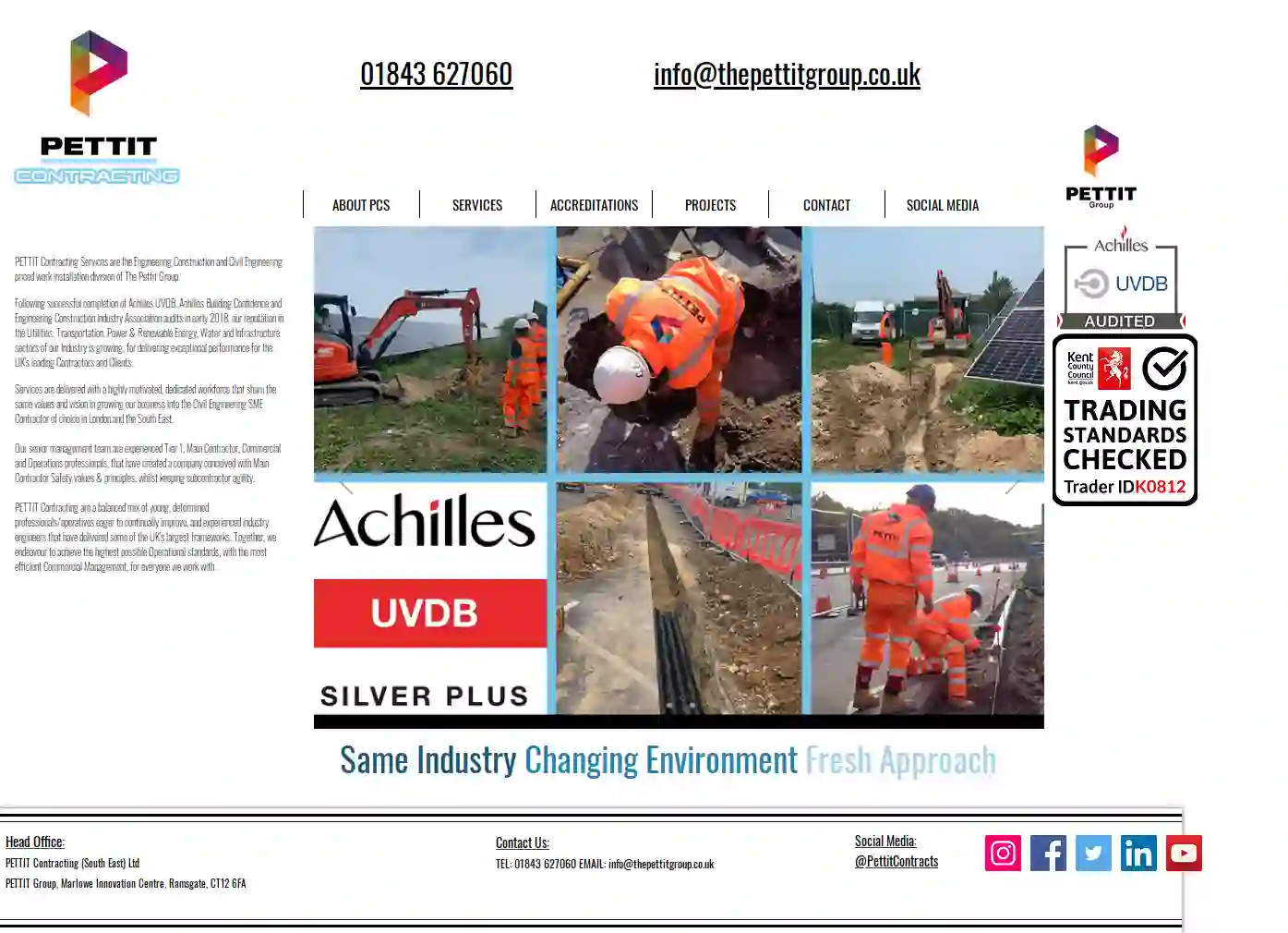
Pettit Contracting (south east) Ltd
52 reviewsPETTIT Group, Marlowe Innovation Centre, Ramsgate, CT12 6FA, GBPETTIT Contracting Services are the Engineering Construction and Civil Engineering priced work installation division of The Pettit Group. Following successful completion of Achilles UVDB, Achilles Building Confidence and Engineering Construction Industry Association audits in early 2018, our reputation in the Utilities, Transportation, Power & Renewable Energy, Water and Infrastructure sectors of our Industry is growing, for delivering exceptional performance for the UK's leading Contractors and Clients. Services are delivered with a highly motivated, dedicated workforce that share the same values and vision in growing our business into the Civil Engineering SME Contractor of choice in London and the South East. Our senior management team are experienced Tier 1, Main Contractor, Commercial and Operations professionals, that have created a company conceived with Main Contractor Safety values & principles, whilst keeping subcontractor agility. PETTIT Contracting are a balanced mix of young, determined professionals/operatives eager to continually improve, and experienced industry engineers that have delivered some of the UK's largest frameworks. Together, we endeavour to achieve the highest possible Operational standards, with the most efficient Commercial Management, for everyone we work with.
- Services
- Why Us?
- Gallery
Get Quote
Dover Demolition Ltd
3.47 reviewsDover, GBEXPERIENCED DEMOLITION COMPANY Dover Demolition are accredited demolition contractors (CSCS, CHAS and Constructionline) with over 35 years of experience in the industry. We are equipped to carry out both large and small demolition work. Our ongoing projects range from residential houses to high-rise blocks, we also undertake all commercial units and structures like; factories, warehouses and bridges. We have successfully carried out building demolition throughout the United Kingdom and welcome all new demolition enquiries. Most of our contracts are carried out across the South East of England, within Greater London, Central London, Kent, Essex, Hertfordshire, Surrey and Sussex.We are focused on client satisfaction and proud to have a core base of customers who commend us for our track record on meeting their targets in a safe, professional and prompt manner. As part of our service, our clients benefit from the expert advice and budget costings that we provide without any obligation. For more information on how we can assist you, contact us today to arrange a site survey and free quotation. OUR MAIN SERVICES ASBESTOS REMOVAL We can offer an asbestos survey service, this is required prior to any demolition or major strip out works taking place. PROJECT MANAGEMENT For your peace of mind we do offer a complete project management of the demolition. We seek to get involved early in the design phase. STRIP OUT We produce site waste management plans “SWAMP” which are handed over to the client following completion of our strip out works. DEMOLITION Our extensive skills and resources allow us to handle complex and technically challenging demolition projects. CRUSHING Our concrete crushers are also offered for hire, alternatively we can provide all plant required to crush your material on site. SITE CLEARANCE We provide a fully comprehensive site clearance service, all waste is disposed at licensed landfill facilities.
- Services
- Why Us?
- Accreditations
- Gallery
Get Quote
Over 13,059+ Excavation Contractors on our directory
Our excavation providers operate in Hythe and surroundings!
ExcavationHQ has curated and vetted Top Excavation Contractors in and around Hythe. Find the most reliable business today.
Frequently Asked Questions About Demolition Contractors
- Enclosure: Sealing off the asbestos-containing material to prevent fiber release.
- Encapsulation: Coating the asbestos-containing material with a sealant to bind the fibers.
- Removal: Carefully removing the asbestos-containing material and disposing of it safely.
- Clear the Site: Remove all furniture, appliances, personal belongings, and any valuable items from the structure.
- Secure the Perimeter: Fence off the demolition area to prevent unauthorized access and protect surrounding property.
- Disconnect Utilities: Arrange for the disconnection of electricity, gas, water, and other utilities servicing the building.
- Hazardous Material Abatement: If asbestos, lead paint, or other hazardous materials are present, have them professionally removed before demolition begins.
- Notify Neighbors: Inform your neighbors about the demolition schedule to minimize disruptions and address any concerns.
- Obtain Permits: Ensure all necessary demolition permits are in place before starting work.
What are the different methods of asbestos abatement?
Can I do demolition myself?
What is asbestos abatement?
How do I prepare my property for demolition?
What are the different methods of asbestos abatement?
- Enclosure: Sealing off the asbestos-containing material to prevent fiber release.
- Encapsulation: Coating the asbestos-containing material with a sealant to bind the fibers.
- Removal: Carefully removing the asbestos-containing material and disposing of it safely.
Can I do demolition myself?
What is asbestos abatement?
How do I prepare my property for demolition?
- Clear the Site: Remove all furniture, appliances, personal belongings, and any valuable items from the structure.
- Secure the Perimeter: Fence off the demolition area to prevent unauthorized access and protect surrounding property.
- Disconnect Utilities: Arrange for the disconnection of electricity, gas, water, and other utilities servicing the building.
- Hazardous Material Abatement: If asbestos, lead paint, or other hazardous materials are present, have them professionally removed before demolition begins.
- Notify Neighbors: Inform your neighbors about the demolition schedule to minimize disruptions and address any concerns.
- Obtain Permits: Ensure all necessary demolition permits are in place before starting work.